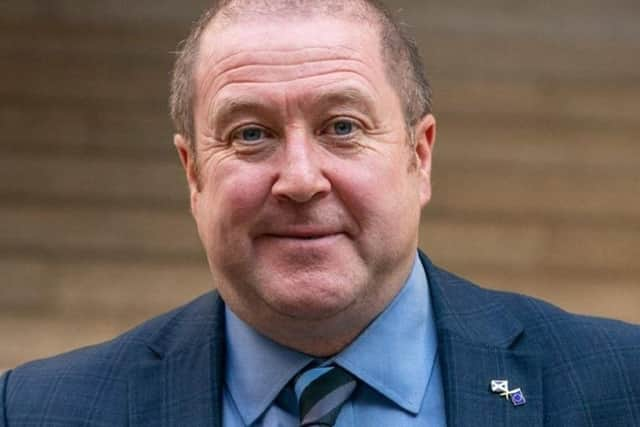Education Scotland: Five key updates from Scottish Government minister Graeme Dey on the future of universities and colleges
Colleges and universities face an uncertain future in Scotland amid fresh funding cuts and proposals for structural reform.
Tens of thousands of staff and students could be impacted by the decisions made by the Scottish Government in the coming months.
Advertisement
Hide AdAdvertisement
Hide AdAs the plans are being drawn up, higher and further education minister Graeme Dey was quizzed by MSPs on Holyrood’s education committee on a range of issues on Wednesday. The Scotsman has summarised some of the key developments outlined by Mr Dey during the evidence session.


A huge overhaul proposed in the Withers review will proceed from March
Major reforms to post-school education were tabled in a report by James Withers in June. It included the creation of a “single national funding body” that could replace the Scottish Funding Council, Skills Development Scotland and potentially the Students Awards Agency for Scotland.
The Scottish Government had already given its backing to some of the ideas in its “purpose and principles” reports.
Giving evidence, Mr Dey went further, saying: "In the context of Withers, one way or another I would anticipate us taking forward pretty much everything that is in there.”


He said he hoped to be able to provide “some tangible information on the first elements” by mid-March, including the initial stages of the approach, such as the consolidation of apprenticeship funding in one place, and the consolidation of student support.
Ministers want to avoid threatening the charitable status of Scottish universities
Universities Scotland warned this week the creation of a new funding body could deliver a “fatal” blow to their finances, by putting their charitable status at “risk”. They feared institutions could be reclassified as public bodies, if the Scottish Government becomes more closely involved in overseeing and funding the sector.
Asked about the warning, Mr Dey said: “I’ve talked earlier about taking time to avoid unintended consequences. That is one that has been flagged to us.
"We’re not as convinced it is as legitimate a concern in reality as the universities do, but we respect the view that they have expressed and, of course, we will take that on board, because that would be counter-productive if we were to do something like that.”
Advertisement
Hide AdAdvertisement
Hide AdUniversities Scotland said any new funding body should have the status of a non-departmental public body (NDPB), ensuring it works independently of ministers. Asked if it would be an NDPB, Lesley Ward, head of public bodies governance and reform at the Government, said: "It’s too early to say at the moment.”
Colleges face more ‘difficult decisions’ and some may need to specialise
Concern has been growing about the future of many of Scotland’s 24 colleges, amid budget cuts, ongoing industrial action and job losses.
Mr Dey said he believed the sector would quite “quickly” be able to take advantage of “opportunities” available under the reform programme. However, he also said it would be a “fair assumption” that no additional funding would be provided in the short term to help deliver the proposed changes.
He said: "Of course there will be some difficult decisions, we are going to have to be realistic here. If we do not have sufficient numbers for a college course to be delivered in every locality, we may well need to move to a kind of ‘centres-of-excellence’ model in some instances, and support young people to make whatever travel they have to do that.
"I’m speculating here, but I think this is the kind of thinking we’re going through at the moment about what is it we need to do to make the colleges more sustainable and viable, have a realistic offering, and one that aligns better with the needs of employers and the economy.
"There may be a pivoting away in some colleges to focus on something they haven’t done until now. We will need to look at some of the courses too. Are they absolutely fit for purpose?”
A new form of the axed Flexible Workforce Development Fund (FWDF) could emerge
The Scotsman revealed last month the FWDF had become another victim of budget cuts. The £10 million scheme had benefited thousands of firms and tens of thousands of workers, by paying for staff training at colleges and the Open University.
Mr Dey said he had hoped to be able to retain the fund in some form, but it was not possible. "I recognise the difficulty that presents, both for employers, for the colleges and also the Open University,” he said. “We’ve been unable in the draft Budget to restore that fund for the coming year, certainly in that form.
Advertisement
Hide AdAdvertisement
Hide Ad"I can’t hide from that and I’m not going to – it’s one of the very difficult decisions that has had to be taken.” The minister suggested a similar initiative might emerge from the shake-up of Scotland’s skills landscape, however.
"Ideally we would want it to form some part of the offering, in the context of the whole reform agenda,” he said.
A pilot project to develop a Scottish version of the Erasmus+ programme is under way
Mr Dey previously announced plans for a scheme that would try to replace the Erasmus+ exchange programme, which the UK controversially left after Brexit.
On Wednesday, he told the education committee that 21 bids, all from universities, had been successful for the proposed new “Scottish Education Exchange Programme”.
The projects are due to proceed over the next three months, after which they will be assessed ahead of the new financial year. Mr Dey said most of the projects were European based, but that one was in South Africa. He said the level of application was “not particularly high”, but that timescales had been “tight”.
Comments
Want to join the conversation? Please or to comment on this article.
